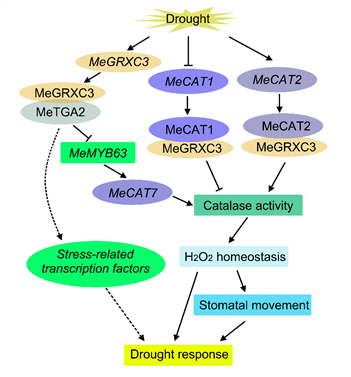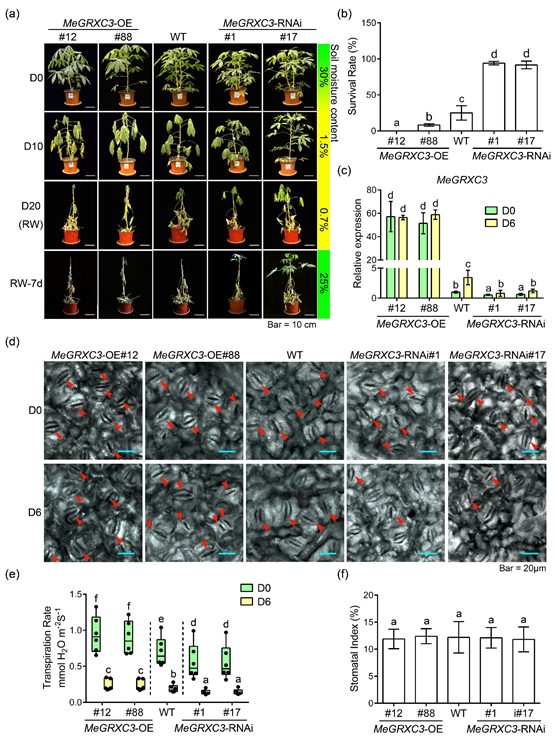Cassava (Manihot esculenta Crantz) is an important tropical crop and one of the main food crops in tropical regions such as Africa. The content of carbohydrate in its root tuber is up to 38%, and it contains a variety of vitamins. It is the main food source for more than 1 billion people in the world. In the process of cassava planting, its seedling stage and root tuber formation stage overlap with the dry season in tropical areas, and drought has a great impact on the yield and quality of cassava. Therefore, identifying important drought resistant genes of cassava and improving the adaptability of cultivated cassava to drought are of great significance to China's "going global" tropical agriculture, supporting the national "the Belt and Road" strategy and maintaining world food security.
The balance of reactive oxygen species (ROS) plays a key role in plant response to drought stress. Glutedoxin is an important component in plants to maintain active oxygen balance, but its molecular mechanism of regulating plant drought stress response through active oxygen balance remains to be explored. Recently, the functional gene research group of the Institute of Tropical Bioscience and Biotechnology of CATAS published a research paper entitled "CC type glossedoxin, MeGRXC3, associations with catalases and nearby regulations around tolerance in cassava (Manihot emerging Cruntz)" online in the authoritative magazine Plant Biotechnology Journal, the top journal of the first district of the Chinese Academy of Sciences. It is confirmed that CC glutaredoxin MeGRXC3 can regulate the activity of catalase and the distribution of hydrogen peroxide in different types of cells of leaf epidermis at the transcriptional and post transcriptional levels, thus regulating the response of cassava to drought stress. The results are helpful to understand the complex mechanism of glutaredoxin regulating drought stress response of cassava through active oxygen balance, and provide gene resources and scientific basis for breeding new drought resistant and high-yield cassava varieties using key genes.
In 100 cultivated cassava germplasms, the team determined that MeGRXC3 was significantly correlated with catalase activity in cassava leaves under drought stress through target interval re sequencing and correlation analysis of drought resistance indicators. Through drought resistance phenotype analysis of transgenic cassava, it was found that MeGRXC3 negatively regulated drought and abscisic acid induced stomatal closure, thus affecting drought tolerance of transgenic cassava. Further analysis showed that MeGRXC3 could antagonically regulate the distribution of hydrogen peroxide in the septal cells and guard cells of the lower epidermis of cassava leaves.
Analysis of drought resistance phenotype of MeGRXC3 transgenic cassava
Using protein immunoprecipitation technology, the research team screened three catalase proteins from cassava leaves that may interact with MeGRXC3, and then confirmed that MeGRXC3 can interact with catalase MeCAT1 and MeCAT2 respectively, and regulate its catalase activity. Moreover, the research team found that MeGRXC3 can regulate the expression of multiple stress related transcription factor genes by interacting with the transcription factor MeTGA2 in the nucleus, and regulate the expression of catalase MeCAT7 gene through the transcription factor MeMYB63, thus regulating the activity of catalase at the transcription level. The above studies opened a new perspective for understanding the molecular mechanism of reactive oxygen species balance regulating plant drought stress response, and showed the potential application value of MeGRXC3 gene in improving cassava root yield under drought environment.

MeGRXC3 regulates the response of catalase to drought stress



